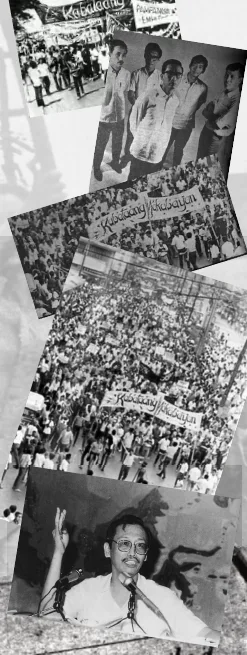As the Kabataang Makabayan (Patriotic Youth, KM) marks its 60th anniversary this year, its enduring legacy to the Philippine national democratic revolution stands as a testament to the historic role of the Filipino youth in social change. Founded on November 30, 1964, on the birth anniversary of Andres Bonifacio (a foremost proletarian hero who led the revolution against Spanish colonialism), by Prof. Jose Maria Sison, KM became a pivotal force in uniting the youth and other sectors and classes in the fight against the Marcos fascist dictatorship in the 1970s.
In his founding speech for the KM, Ka Joma, then a young and fiery activist, declared, “it is the chief task of the Filipino youth to resume and complete the unfinished revolution under the banner of national democracy, to expose and oppose the national and social iniquities caused by US imperialism and its local reactionary allies.” This challenge continues to reverberate across generations of activists and revolutionaries, inspiring countless youth to take up the struggle against oppression and exploitation. Today, Ka Joma’s teachings to the youth continue to ignite the fervor of a new generation committed to carrying forward the movement for national and social liberation.
KM was born during a period of political turbulence and widespread social unrest. Ka Joma reminds us that “KM did not drop from the sky. It emerged in response to the extreme reaction and rabid anti-communism that followed the defeat of the old people’s army and the armed revolutionary movement of the people in the early 1950s. It arose from the concrete conditions of sharpening oppression and exploitation of the Filipino youth and people from the early 1960s onwards.”
Under Ka Joma’s leadership, KM became the first comprehensive youth organization to articulate the call for national democracy and link it to the broader anti-imperialist, anti-fascist and anti-feudal struggles. By mobilizing students, workers, peasants and young professionals, KM solidified its role as the militant vanguard of the Filipino youth.

From the First Quarter Storm of the 1970s to its resistance against martial law and successive reactionary regimes in subsequent decades, KM has consistently demonstrated courage and resolve. Despite repression, its spirit has never been extinguished. It remains a symbol of resilience, illustrating the capacity of the youth to shape history.
The conditions today are ripe for the youth to continue their vital task in arousing, organizing, and mobilizing the Filipino masses. Economic inequality, political repression, and widespread landlessness provide fertile ground for mass resistance. These conditions empower the youth to invigorate the national democratic struggle and bring more sectors into the struggle for genuine change.
Further, the youth must actively engage in cultural revolution to rectify errors and advance boldly their struggle. The youth must engage in a profound study movement to revisit the lessons of Marxism-Leninism-Maoism. Equally important is the need for the youth to link up with the toiling masses of workers and peasants, who remain the backbone of the revolutionary movement. By integrating with these exploited classes, the youth can help amplify their struggles and channel their collective power toward genuine social liberation.
By immersing themselves in the struggles of workers, peasants and other exploited classes, the revolutionary youth can overcome the petty-bourgeois tendencies that often surface within their ranks. Integration with the toiling masses fosters humility and revolutionary discipline ensuring that the revolutionary movement remains rooted in the masses’ collective power and wisdom to transform society. It also serves as a means to repudiate reactionary and individualistic influences, advancing a culture of selflessness, while steeling their commitment and collective action.
Ka Joma in one of his many messages to the youth emphasized, “for the youth to know so much is for them to act more effectively and cooperate more thoroughly on the side of progress in the historical process of change.” This call to action remains a guiding light for young activists and revolutionaries to dismantle systems of oppression and build a better future.
As the Filipino masses continue to grapple with chronic crises and systemic inequalities, landlessness and low wages, KM’s mission resonates more than ever to the Filipino youth today. The youth, armed with the lessons of the past and the determination to shape the future, are poised to fulfill their historic role in the revolutionary struggle against imperialism, bureaucrat capitalism and feudalism.
The 60th anniversary of Kabataang Makabayan is not merely a celebration of its past but a reaffirmation of its commitment to the Filipino people’s aspirations. It reminds us that the fight for genuine democracy and liberation is far from over and that the youth’s energy, creativity, and courage will always play a crucial role in the victory of the revolution. As Ka Joma’s enduring words remind us: “Dare to struggle, dare to win.”#

